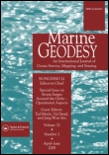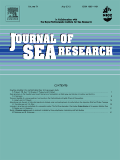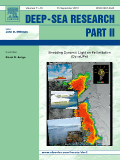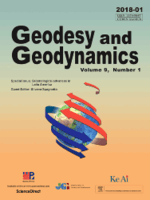
MARINE GEODESY
metrics 2024
Illuminating the Secrets of Marine Spatial Dynamics
Introduction
MARINE GEODESY, an esteemed journal published by Taylor & Francis Inc, delves into the intricate field of oceanography, aiming to contribute profoundly to the understanding of marine spatial dynamics and geophysical processes. With an ISSN of 0149-0419 and an E-ISSN of 1521-060X, this journal has a commendable standing, currently classified in the 2023 Q2 quartile, reflecting its influential presence in the realm of Earth and Planetary Sciences, particularly oceanography, where it ranks 49th out of 145 journals. Since its inception in 1977 and its ongoing publication until 2024, MARINE GEODESY has been dedicated to disseminating groundbreaking research, case studies, and reviews that are crucial for scholars, professionals, and students engaged in the exploration of marine environments. While currently not an open-access journal, it nevertheless offers vital insights into marine geospatial analytics and geodesy, augmenting the knowledge base necessary for tackling contemporary challenges in marine science and geography.
Metrics 2024
 0.56
0.56 2.00
2.00 2.10
2.10 56
56Metrics History
Rank 2024
Scopus
IF (Web Of Science)
JCI (Web Of Science)
Quartile History
Similar Journals

JOURNAL OF SEA RESEARCH
Exploring the Depths of Aquatic KnowledgeJOURNAL OF SEA RESEARCH, published by Elsevier, is a premier academic journal dedicated to advancing knowledge in the fields of aquatic science, ecology, and oceanography. Since its inception in 1996, this journal has provided a vital platform for researchers and professionals to disseminate groundbreaking findings and promote fostering interdisciplinary discussions. With its impressive Q2 ranking in multiple categories, including Aquatic Science and Ecology, Evolution, Behavior and Systematics, it positions itself as a significant contributor to marine and environmental studies. The journal is accessible in both print (ISSN: 1385-1101) and online formats (E-ISSN: 1873-1414), ensuring wide reach and engagement within the scholarly community. Researchers and students alike will find the journal not only a reliable source of information but also a source of inspiration for future explorations. With a commitment to quality and a broad scope that spans fundamental to applied research, JOURNAL OF SEA RESEARCH remains an indispensable resource for understanding the complexities of marine environments and their relevance to our changing world.

Jurnal Ilmu dan Teknologi Kelautan Tropis
Connecting researchers to preserve our tropical oceans.Jurnal Ilmu dan Teknologi Kelautan Tropis (ISSN: 2087-9423, E-ISSN: 2085-6695) is a premier scientific journal published by the Indonesian Oceanologists Association in collaboration with the Bogor Agricultural University, specifically from the Department of Marine Science and Technology. This journal is committed to advancing the field of tropical marine science, publishing high-quality research that addresses pressing issues in oceanography, marine ecosystems, and sustainable practices in tropical regions. By facilitating open access to valuable scientific knowledge, Jurnal Ilmu dan Teknologi Kelautan Tropis aims to engage researchers, professionals, and students alike, fostering collaboration and innovation in marine research. Located in the picturesque region of Bogor, West Java, Indonesia, this journal serves as a vital platform for disseminating findings that contribute to the conservation and effective management of tropical marine resources.

DEEP-SEA RESEARCH PART II-TOPICAL STUDIES IN OCEANOGRAPHY
Transforming Understanding of Marine EnvironmentsDEEP-SEA RESEARCH PART II-TOPICAL STUDIES IN OCEANOGRAPHY is a leading journal in the field of oceanography, published by PERGAMON-ELSEVIER SCIENCE LTD. With an impressive ranking of Q1 in Oceanography and holding the 20th position out of 145 journals in the Earth and Planetary Sciences category, this journal provides a prominent platform for researchers and practitioners alike. Covering topical studies in oceanography since its inception in 1993, it continues to contribute significant insights into deep-sea research, enhancing our understanding of marine environments. Although the journal does not presently offer Open Access options, it remains a vital resource, appealing to students and professionals who seek to engage with innovative research and practical applications in the oceanographic community. The journal's ongoing commitment to excellence is evident as it plays a crucial role in advancing the field leading up to the present day and beyond.

STUDIA GEOPHYSICA ET GEODAETICA
Shaping the Future of Geophysical Knowledge Since 1957STUDIA GEOPHYSICA ET GEODAETICA, published by Springer, is a prestigious scientific journal that has been at the forefront of the fields of Geochemistry, Petrology, and Geophysics since its inception in 1957. With an ISSN of 0039-3169 and an E-ISSN of 1573-1626, the journal serves as a vital platform for disseminating original research and reviews that enhance our understanding of the Earth’s processes. Situated in the Netherlands, the journal is indexed in notable databases, holding a respectable Tier Q3 ranking in both Geochemistry and Petrology, as well as Geophysics, based on the 2023 metrics. With its commitment to academic rigor, the journal seeks to engage a diverse audience of researchers, professionals, and students, facilitating vital discourse and advancements in Earth sciences. Although it does not currently offer open access options, it remains a significant resource for those aiming to contribute to or further their knowledge within these critical disciplines.

Geodesy and Geodynamics
Elevating Research in Earth Sciences to New Heights.Geodesy and Geodynamics is a premier open-access journal dedicated to the interdisciplinary fields of geodesy and geodynamics, published by KEAI PUBLISHING LTD. With a commitment to accessibility since 2010, this journal serves as an essential platform for researchers, professionals, and students in understanding the Earth's structure, dynamics, and geophysical processes. Based in China, it has rapidly gained recognition, earning a commendable Q2 ranking in various categories, including Computers in Earth Sciences, Earth-Surface Processes, and Geophysics. The journal covers critical advances in theory and practice, making significant contributions to the study of planetary sciences. Researchers can benefit from a robust readership and impactful dissemination of their work, as evidenced by its solid positions in Scopus rankings. Moving forward, Geodesy and Geodynamics aims to continue fostering innovation and collaboration within the geoscience community through high-quality research and comprehensive review articles.

Physical Oceanography
Connecting Science and the SeaPhysical Oceanography is an esteemed open-access journal dedicated to the exploration and dissemination of research on the dynamic processes that govern the physical aspects of oceans. Published by the Federal State Budget Scientific Institute, Marine Hydrophysical Institute, this journal provides a forum for innovative studies and significant findings in the fields of fluid flow, geophysics, ocean engineering, and water science. With an ISSN of 0928-5105 and an E-ISSN of 1573-160X, Physical Oceanography has been granting open access to its valuable content since 2015, ensuring widespread accessibility and impact in the scientific community. Its rigorous peer-reviewed articles are crucial for researchers, professionals, and students who aim to advance their knowledge and understanding of the intricacies that govern our oceans. With a current impact factor reflecting its solid standing in the Q3 category across multiple disciplines, including oceanography and geophysics, this journal remains a vital resource for advancing oceanographic research and innovation.

OCEANOLOGY
Pioneering Research for a Sustainable Ocean FutureOCEANOLOGY is a distinguished journal published by Pleiades Publishing Inc that has been a pivotal platform for advancing knowledge in the field of oceanography since its inception. With an ISSN of 0001-4370 and E-ISSN 1531-8508, this journal covers a range of topics related to marine sciences, geographical oceanography, and environmental studies, providing insights and research that significantly contribute to our understanding of oceanic systems. Recognized for its academic rigor, OCEANOLOGY holds a Q3 quartile ranking in the Oceanography category as of 2023, reflecting its impact within the scientific community as evidenced by its Scopus rank of 85 out of 145. Although currently not an open-access journal, OCEANOLOGY remains essential for researchers, professionals, and students by offering a comprehensive collection of peer-reviewed articles. This multidisciplinary approach equips its audience with valuable data and perspectives critical for ongoing research and development in ocean-related fields.

MARINE GEOPHYSICAL RESEARCH
Uncovering the geological secrets beneath the waves.MARINE GEOPHYSICAL RESEARCH is a prominent journal published by Springer, dedicated to advancing the field of marine geophysics, with significant contributions to geochemistry, petrology, and oceanography. Established in 1970 and currently running its volumes until 2024, this journal operates as a key resource for researchers and professionals focused on understanding the complexities of marine environments and geological processes. With a strong foothold in academic rankings—positioned in Q2 for both Geophysics and Oceanography, and Q3 for Geochemistry and Petrology in the 2023 category quartiles—MARINE GEOPHYSICAL RESEARCH provides a rigorous platform for high-quality research dissemination. Although not an open-access journal, it offers invaluable insights into marine geophysical phenomena, thus appealing to a diverse audience of scholars and practitioners. The journal’s relevance and impact are further underscored by its Scopus ranks, situating it competitively within the Earth and Planetary Sciences domain. Researchers and students seeking to stay abreast of cutting-edge developments and methodologies in marine geophysics will find it an essential addition to their academic resources.

TELLUS SERIES A-DYNAMIC METEOROLOGY AND OCEANOGRAPHY
Connecting Oceans and Atmospheres: Where Science Meets InsightTELLUS SERIES A-DYNAMIC METEOROLOGY AND OCEANOGRAPHY, published by Stockholm University Press, is a prestigious open-access journal that has been at the forefront of research in the fields of atmospheric science and oceanography since its inception in 1983. With an enduring commitment to disseminating high-quality, peer-reviewed research, the journal has achieved a commendable impact factor, securing its position in the Q2 category for both Atmospheric Science and Oceanography as of 2023. The journal's significant reach is reflected in its Scopus rankings, being positioned at Rank #51 in Oceanography and Rank #77 in Atmospheric Science. With open access established since 2012, TELLUS SERIES A serves not only as a vital resource for researchers and professionals in these dynamic fields but also as an inclusive platform for budding scholars and students. Engaging with this journal allows readers to stay updated on the latest developments and groundbreaking discoveries that advance our understanding of climate systems and marine environments. Its editorial ethos emphasizes the cross-disciplinary integration of atmospheric and oceanographic studies, making it an essential publication for anyone invested in environmental research and policy.

Boletim de Ciencias Geodesicas
Pioneering Discoveries in the Dynamic World of GeodesyBoletim de Ciências Geodésicas is an esteemed academic journal published by the Universidade Federal do Paraná within its Centro Politécnico. Focused on the dynamic field of Earth and Planetary Sciences, this Open Access journal has been a pivotal resource since 1997, fostering the dissemination of critical research and innovative methodologies. With an impact factor indicative of its relevance in the discipline, Boletim de Ciências Geodésicas ranks in the Q3 quartile for Earth and Planetary Sciences as of 2023, showcasing its commitment to quality scholarship in a competitive field. Researchers and students alike will benefit from access to cutting-edge findings, given its broad scope that encompasses various aspects of geodesy and related sciences. The journal's convergence of research from 2005 to 2024 ensures that it remains at the forefront of emerging trends and fundamental developments in the discipline, further enhancing its esteemed reputation in the academic community.